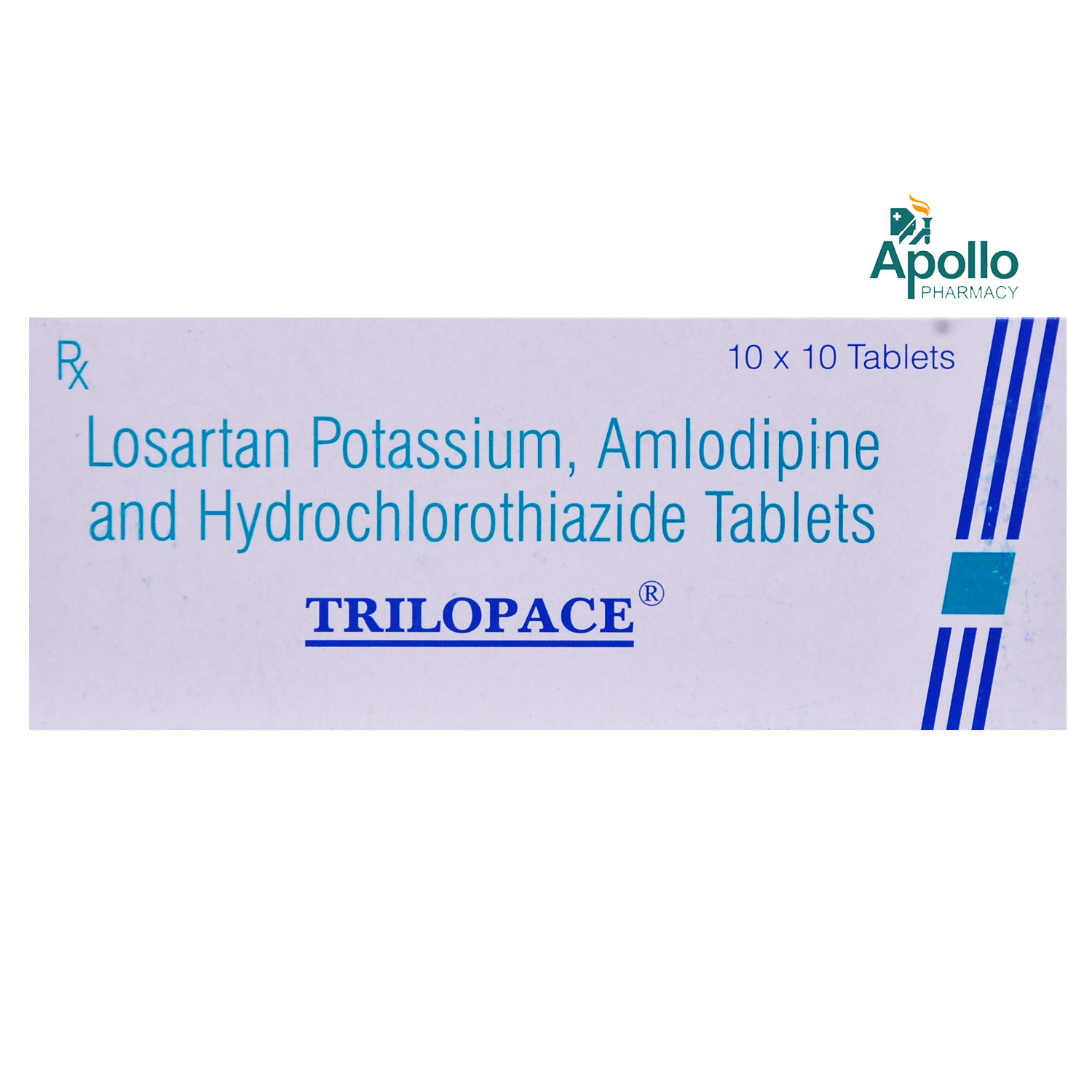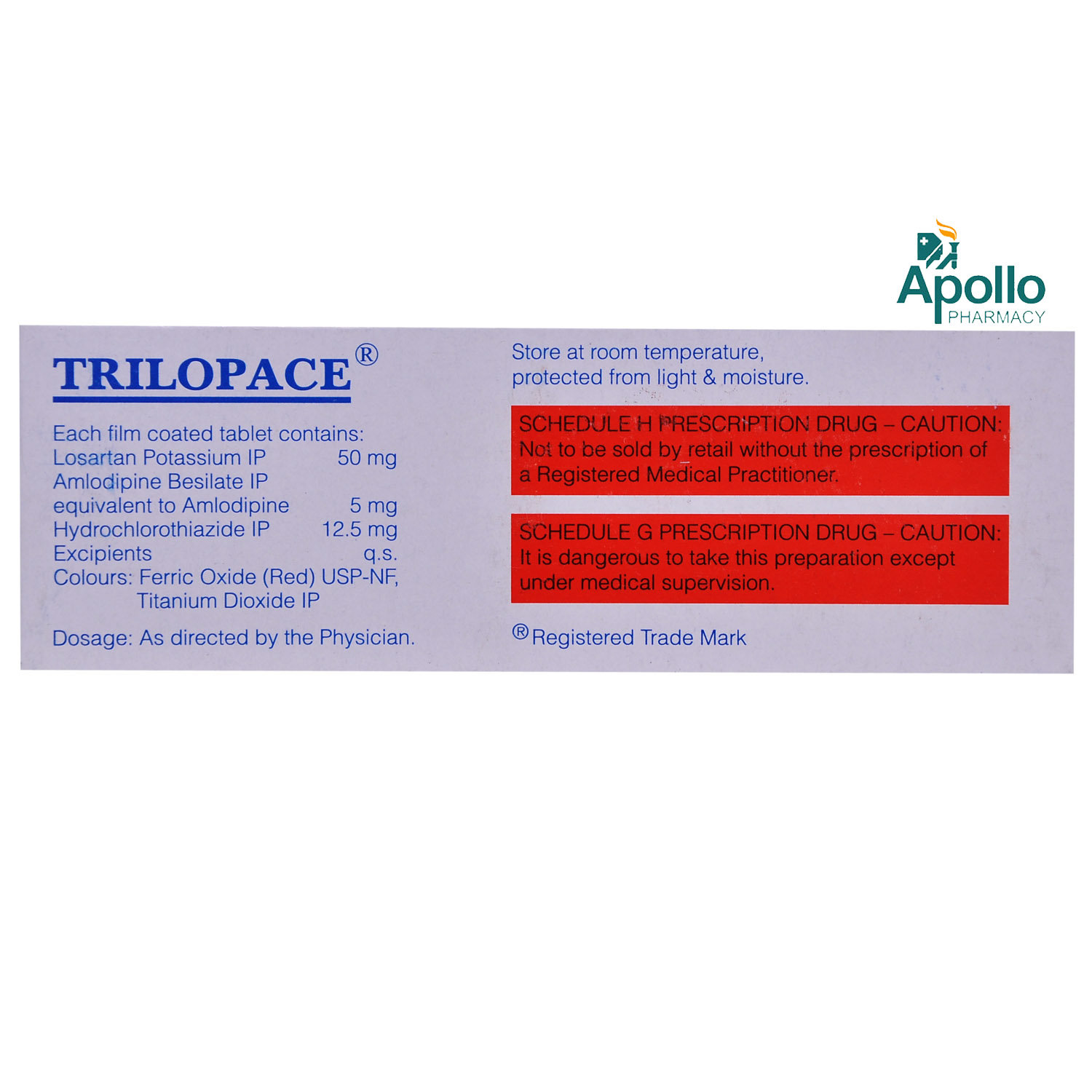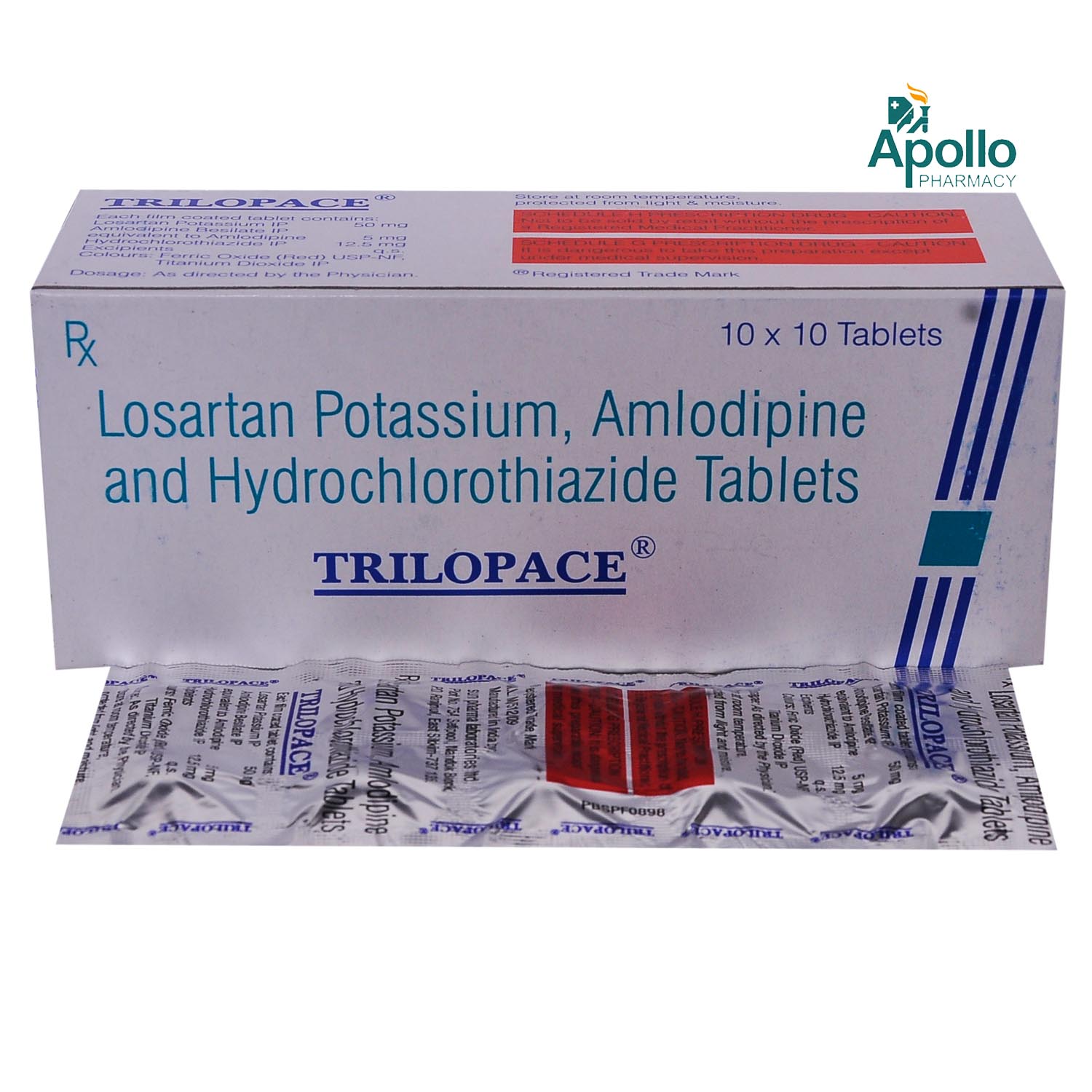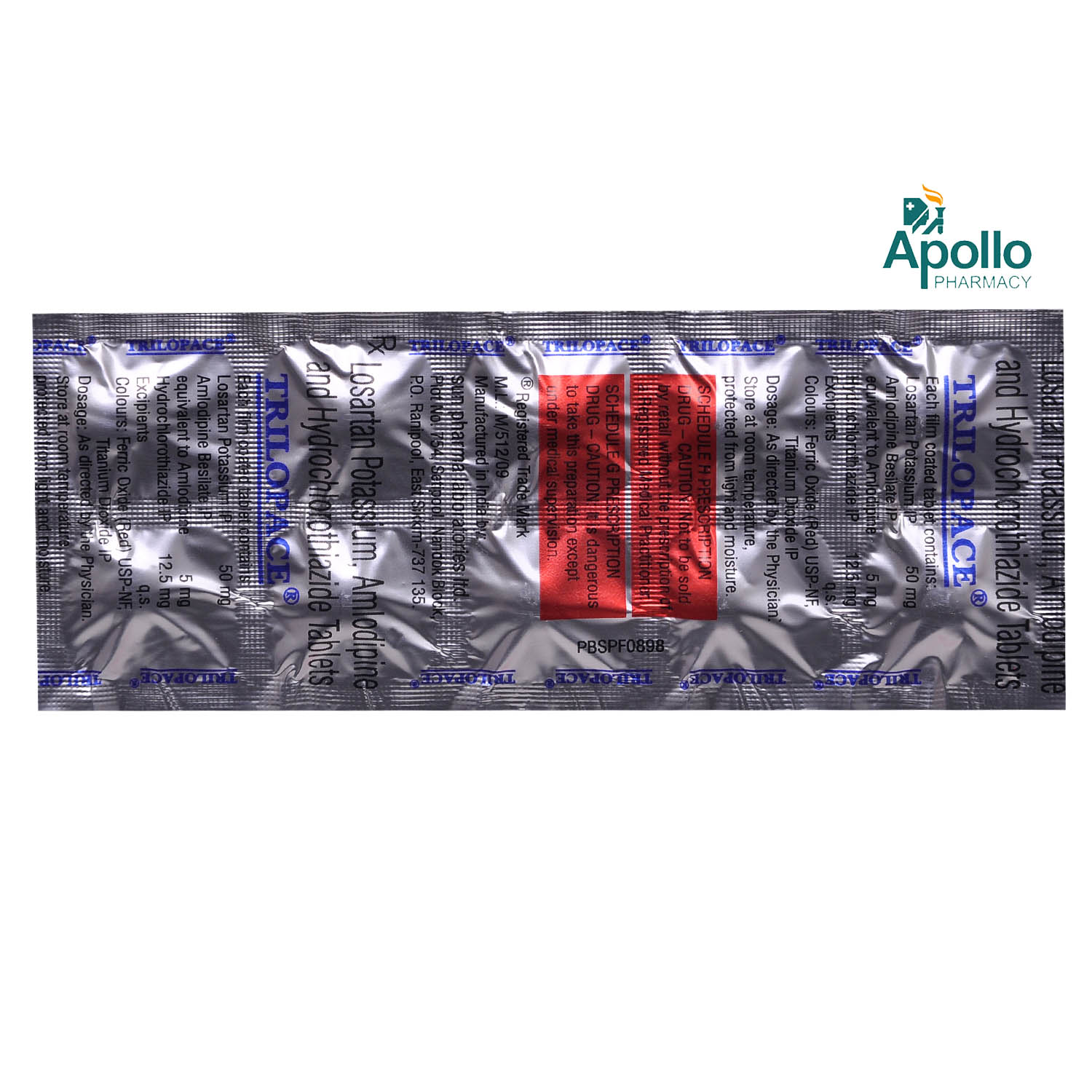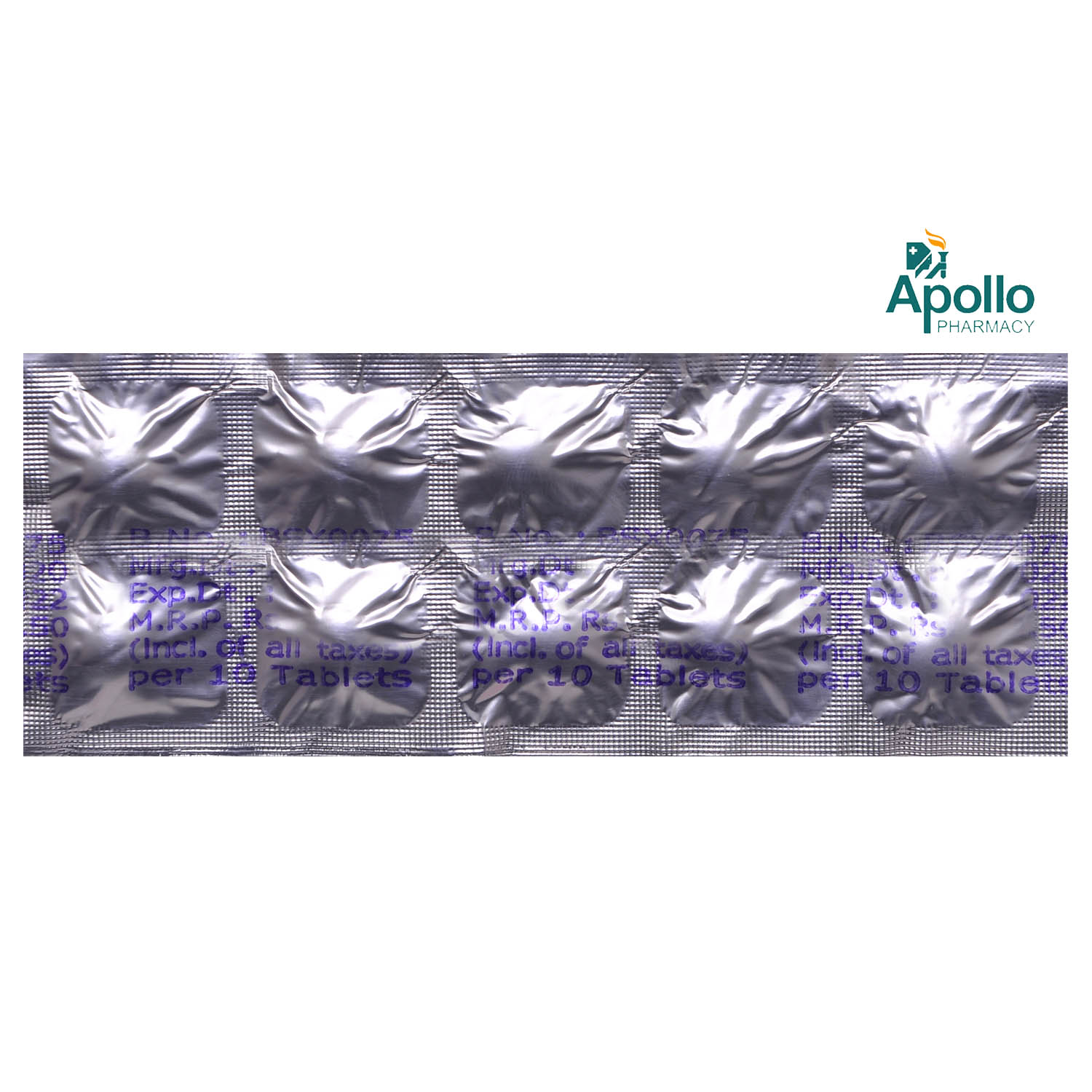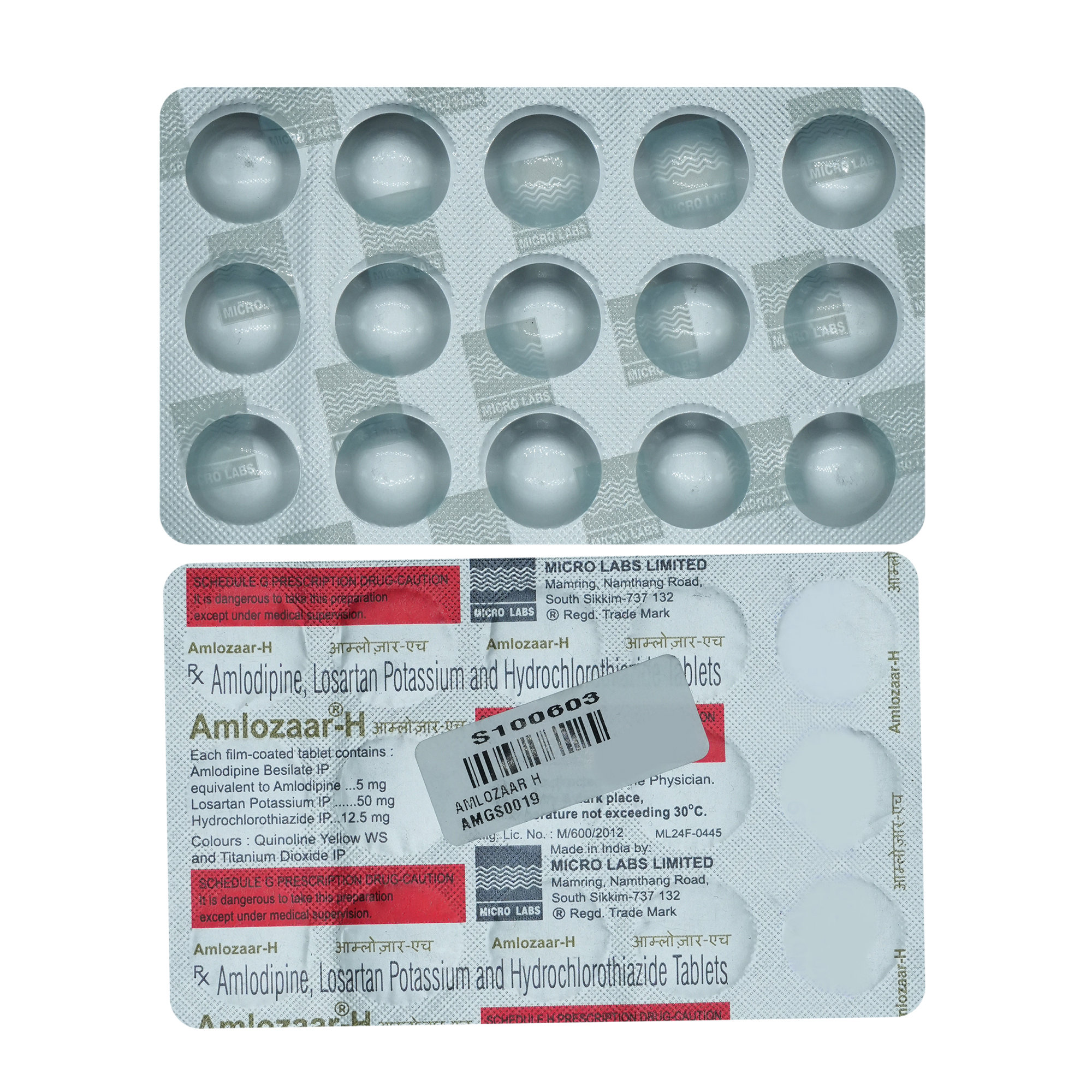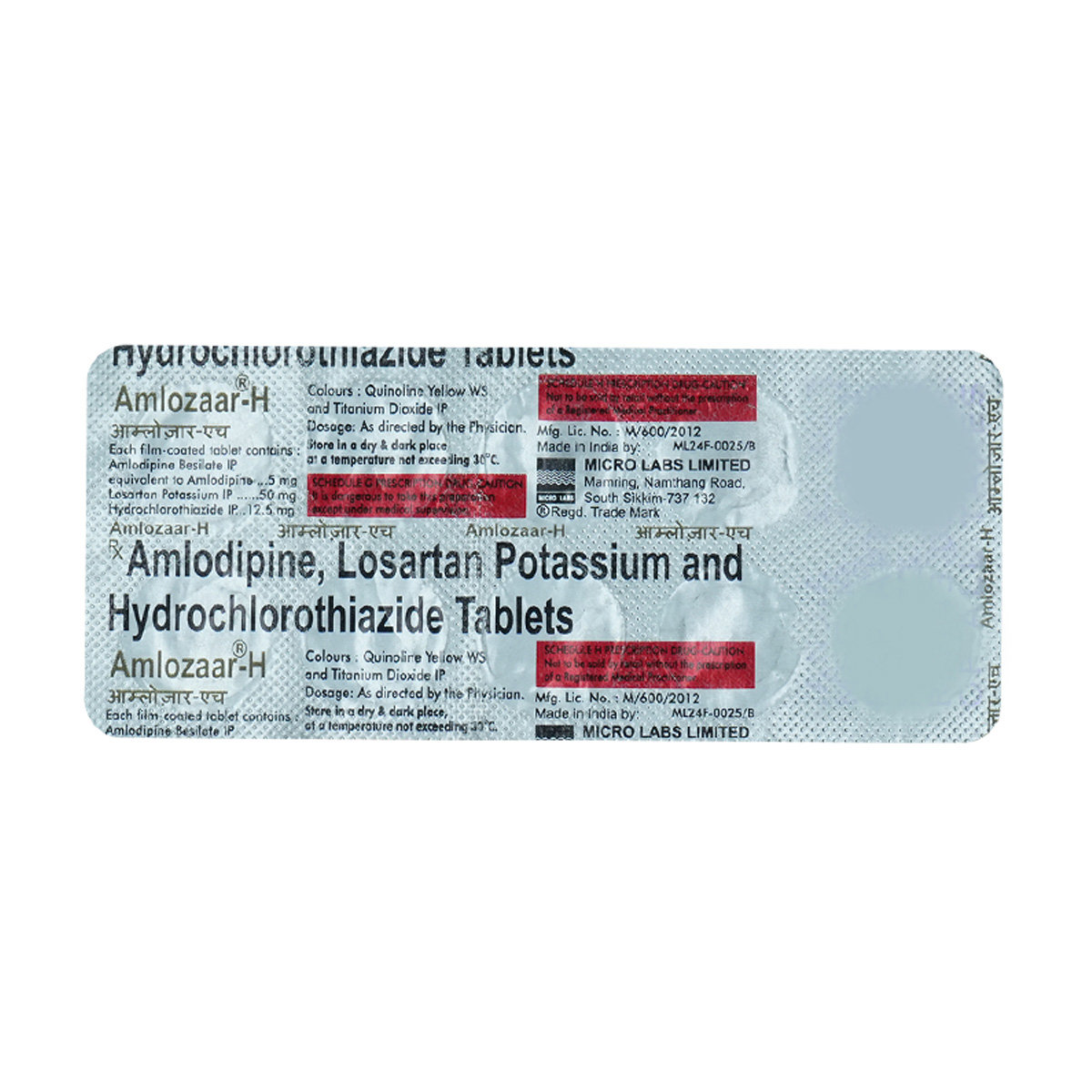Trilopace Tablet 10's
MRP ₹158
(Inclusive of all Taxes)
₹23.7 Cashback (15%)
Provide Delivery Location
Online payment accepted
 Prescription drug
Prescription drugWhats That
Manufacturer/Marketer :
Consume Type :
Expires on or after :
Return Policy :
About Trilopace Tablet
Trilopace Tablet is an 'anti-hypertensive' medication primarily used in the treatment of high blood pressure (hypertension). High blood pressure or hypertension is a chronic condition in which the blood's force against the walls of blood vessels, is consistently too high. As a result, this can ultimately lead to heart-related conditions like heart failure, stroke, and irregular heartbeat.
Trilopace Tablet is a combination of three medicines namely: Amlodipine, Hydrochlorothiazide, and Losartan. Amlodipine belongs to class medicines known as calcium channel blocker that dilates (widens) blood vessels and increases blood flow. It helps to lower blood pressure, reduce chest pain (angina), and other complications caused by coronary artery disease. Hydrochlorothiazide is a diuretic or water pill that works by removing extra water/fluid and certain electrolytes overload from the body. Losartan belongs to class medicines known as angiotensin receptor blocker (ARB) that works by blocking the hormone angiotensin, thereby relaxing and widening the narrowed blood vessels. This allows the blood to flow more smoothly in the blood vessels, and the heart can pump more efficiently. Thus, all together Trilopace Tablet helps in controlling high blood pressure.
You may experience nausea, altered taste, diarrhea, stomach upset, dizziness, flushing (sense of warmth in the face, ears, neck, and trunk), headache, numbness (lost, reduced, or altered sensation) of extremity in some cases. Most of these side effects of Trilopace Tablet do not require medical attention and gradually resolve over time. However, if the side effects are persistent, reach out to your doctor.
Do not use potassium supplements or salt substitutes unless the doctor has told you. If you notice unexplained muscle pain, dark color urine, tenderness, or weakness, especially if you also have a fever or unexplained tiredness, immediately contact the doctor. Try not to stop taking this medicine on your own. Let your doctor know about this, as stopping abruptly may provoke rapid upswings in blood pressure. Inform your doctor before starting this medication course if you are suffering from kidney, liver, or heart disease. Pregnant and breastfeeding women should not take Trilopace Tablet without proper consultation or inputs from their OB/GYN.
Uses of Trilopace Tablet
Directions for Use
Key Benefits
Trilopace Tablet is a combination of three medicines, namely: Amlodipine, Hydrochlorothiazide, and Losartan. Amlodipine belongs to class medicines known as calcium channel blockers. Amlodipine is known to work by inhibiting the entry of calcium ions across cardiac (heart) and smooth muscle causing relaxation and dilation (widening) of these muscles. Amlodipine does not change serum calcium concentrations. Hydrochlorothiazide is a diuretic or water pill. Hydrochlorothiazide works by inhibiting the sodium chloride transport in the distal convoluted tubule (a portion of the kidney nephron). Along with accompanying fluid, more sodium is then excreted in the kidney. This increases the flow of urine and reduces the amount of water in the body, thereby helps in lowering blood pressure. Losartan is an angiotensin receptor blocker (ARB) that works by blocking the hormone angiotensin, thereby relaxing and widening the narrowed blood vessels. This allows the blood to flow more smoothly in the blood vessels, and the heart can pump more efficiently. Thus, all together Trilopace Tablet helps in controlling high blood pressure.
Storage
- Reduce salt intake to minimize fluid buildup.
- Use compression stockings, sleeves, or gloves.
- Gently massage the affected area towards the heart.
- Protect the swollen area from injury and keep it clean.
- Use lotion or cream to keep the skin moisturized.
- A blocked nose can be relieved by drinking more water, which helps clear fluids.
- Use saline nasal spray available over the counter to relieve blockage or blow harder to remove the mucus.
- Use nasal strips that can be placed on the nose to widen nostrils and increase airflow.
- Keep a humidifier around to moisten air at home/workplace.
- Muscle cramps can be treated with regular exercise or yoga, which includes mild stretching, which helps strengthen the lower body.
- Warm baths and gentle massage of the affected parts can help relieve cramps.
- Avoid strenuous activity and take frequent breaks, as rest is critical.
- Intake of nutritious food can help strengthen body and mind. A trained nutritionist can help design a balanced diet for strengthening muscles.
- Speak to your doctor if the pain lasts an extended period. Medical help can be practical in finding a cure for cramps.
- Limit fruit intake to two servings a day, choose a low-potassium options like apples and strawberries.
- Restrict starchy vegetables like potatoes and pumpkin to half a cup daily.
- Avoid or limit foods like tomato products, high-bran cereals, and salty or sugary snacks.
- Limit dairy products to 200g of yoghurt or 300ml of milk per day.
- Do not stand up suddenly. Lie down and get up slowly only when you feel better.
- Avoid alcohol and large meals.
- Drink enough water before standing for long periods.
- Exercise regularly; however, avoid exercising in extreme heat.
- Eat small, low-carb meals.
- Wear compression stockings.
- Prepare for a restful night's sleep: Develop a calming pre-sleep routine, like reading or meditation, to help your body relax and prepare for sleep.
- Create a sleep-conducive Environment: Make bedroom a sleep haven by ensuring it is quiet, dark and calm.
- Follow a Sleep Schedule: Go to bed and get up at the same time every day to help regulate your body's internal clock and increase sleep quality.
- Try relaxing techniques like deep breathing, mindfulness meditation and any others.
- Limit stimulating activities before bedtime: Avoid stimulating activities before bedtime to improve sleep quality.
- Monitor Progress: Keep track of your sleep patterns to identify areas for improvement.
- Consult a doctor if needed: If these steps don't improve your sleep, consult a doctor for further guidance and therapy.
- Avoid triggers like alcohol, caffeine, and energy drinks.
- Try relaxation techniques such as yoga, meditation, or deep breathing.
- Exercise regularly as it helps maintain heart health.
- Follow a nutritious and balanced diet.
Drug Warnings
Do not use Trilopace Tablet if you are pregnant, planning for pregnancy, or if you are unable to urinate (anuria). Trilopace Tablet may pass into breast milk, so before starting Trilopace Tablet , either you need to stop nursing, or you should not take Trilopace Tablet while breastfeeding. Please inform your doctor/surgeon before surgery that you are on Trilopace Tablet as it needs to be stopped because it might lower the blood pressure further if taken along with certain anesthesia medication. Avoid intake of potassium salt or its substitute while using Trilopace Tablet to avoid any electrolytes imbalance. Trilopace Tablet should be used with extreme caution in patients with liver, kidney, cardiovascular diseases and diabetic patients. Use only if the potential benefit justifies the potential risk. Your doctor will weigh the benefits and any potential risks before prescribing it to you.
Drug-Drug Interactions
Drug-Drug Interactions
Login/Sign Up
Taking Cisapride and Trilopace Tablet can increase the risk of an irregular heart rhythm which can be severe. The risk increases in patients with a history of heart illness or electrolyte imbalance.
How to manage the interaction:
Combining Cisapride and Trilopace Tablet together is generally avoided as it can possibly result in an interaction, it can be taken if advised by your doctor. However, if you experience any symptoms like dizziness, lightheadedness, fainting, or fast or pounding heartbeats, consult the doctor immediately. Do not stop using any medications without a doctor's advice.
Taking Dofetilide and Trilopace Tablet can increase the risk of an irregular heart rhythm which can be severe. The risk increases in patients with a history of heart illness or electrolyte imbalance.
How to manage the interaction:
Combining Dofetilide and Trilopace Tablet together is not recommended as it can possibly result in an interaction, it can be taken if advised by your doctor. However, if you experience any symptoms like sudden dizziness, lightheadedness, fainting, shortness of breath, chest pain or tightness, rapid heartbeat, or memory loss, contact your doctor immediately. Do not discontinue any medications without consulting a doctor.
Using Trilopace Tablet together with dantrolene may increase the risk of hyperkalemia (high blood potassium).
How to manage the interaction:
Taking Trilopace Tablet with Dantrolene can cause an interaction, consult a doctor before taking it. You should seek medical attention if you experience nausea, vomiting, weakness, confusion, tingling of the hands and feet, a weak pulse, or a slow or irregular heartbeat. Do not stop using any medications without talking to a doctor.
Coadministration of Amiodarone together with Trilopace Tablet may raise the risk of an abnormal heart rhythm.
How to manage the interaction:
Even though Amiodarone and Trilopace Tablet interact, they can be used if prescribed by a doctor. If you have cardiac problems or electrolyte imbalances, you may be at greater risk. If you experience abrupt dizziness, lightheadedness, fainting, shortness of breath, or rapid heartbeat, Weakness, tiredness, drowsiness, confusion, painful muscle cramping, dizziness, nausea, or vomiting, get medical attention. Do not discontinue any medications without consulting a doctor.
The combined use of Tizanidine and Trilopace Tablet can have additive effects in lowering your blood pressure.
How to manage the interaction:
Taking Tizanidine and Trilopace Tablet together can possibly result in an interaction, but they can be taken if advised by your doctor. However, if you experience any symptoms like headache, dizziness, lightheadedness, fainting, and changes in pulse or heart rate, consult a doctor immediately. Do not stop using any medications without a doctor's advice.
Co-administration of Dronedarone and Trilopace Tablet can increase the risk of severe irregular heart rhythm which can be severe. The risk increases in patients with a history of heart illness or electrolyte imbalance.
How to manage the interaction:
Taking Dronedarone and Trilopace Tablet together is avoided as it can possibly result in an interaction, it can be taken if advised by your doctor. However, if you experience any symptoms like dizziness, lightheadedness, fainting, fast heartbeats, weakness, tiredness, drowsiness, confusion, muscle pain, cramps, nausea, or vomiting, consult the doctor immediately. Do not stop using any medications without a doctor's advice.
Co-administration of Droperidol and Trilopace Tablet can increase the risk of an irregular heart rhythm which can be severe. The risk increases in patients with a history of heart illness or electrolyte imbalance.
How to manage the interaction:
Taking Droperidol and Trilopace Tablet together can possibly result in an interaction, but they can be taken if advised by your doctor. However, consult the doctor immediately if you experience any symptoms like dizziness, lightheadedness, fainting, fast heartbeats, weakness, tiredness, drowsiness, confusion, muscle pain, cramps, nausea, or vomiting. Do not stop using any medications without a doctor's advice.
Taking Ziprasidone and Trilopace Tablet can increase the risk of an irregular heart rhythm which can be severe. The risk increases in patients with a history of heart illness or electrolyte imbalance.
How to manage the interaction:
Taking Ziprasidone and Trilopace Tablet together is avoided as it can possibly result in an interaction, but it can be taken together if prescribed by a doctor. However, consult your doctor if you experience sudden dizziness, lightheadedness, fainting, shortness of breath. Do not discontinue any medications without consulting a doctor.
Coadministration of Aminolevulinic acid with Trilopace Tablet can make your skin more sensitive to bright lights. This could increase the risk or severity of developing a sunburn.
How to manage the interaction:
Although there is a possible interaction between Aminolevulinic acid and Trilopace Tablet, it can be taken if advised by your doctor. Avoid exposure of the eyes and skin to sunlight or bright indoor lights for 48 hours. Do not stop using any medications without a doctor's advice.
Coadministration of Lithium and Trilopace Tablet can increase the effects of lithium.
How to manage the interaction:
Taking Lithium and Trilopace Tablet together can possibly result in an interaction, but it can be taken if advised by your doctor. However, if you experience any symptoms like loose stools, vomiting, drowsiness, shaking of hands and legs, thirst, increased urination, lack of coordination, or muscle weakness, consult the doctor immediately. Do not stop using any medications without a doctor's advice.
Drug-Food Interactions
Drug-Food Interactions
Login/Sign Up
Diet & Lifestyle Advise
- Do regular physical activity or exercise for at least 150 minutes per week, or about 30 minutes most days of the week. Doing this can help you to lower your raised blood pressure by about 5 mm of Hg.
- Keep your weight under control with BMI of 19.5-24.9.
- Limit intake of sodium chloride (table salt) in your daily diet to 2300 mg per day or less than 1500 mg is ideal for most adults.
- Quitting smoking is the best strategy to lower the risk of heart disease.
- Avoid chronic stress as it can raise your blood pressure. Try to enjoy and spent time with your loved ones to cope with stress and practice mindfulness techniques.
- Monitor your blood pressure daily and if there is too much fluctuation, then immediately contact your doctor.
- Try to include heart-healthy omega 3 fatty acids-containing food drinks in your daily diet. You can also use low-fat cooking oil like olive oil, soybean oil, canola oil, and coconut oil to lower your elevated blood pressure.
- Option for a diet rich in whole grains, fruits, veggies, and low-fat dairy products.
Side Effects of Trilopace Tablet
- Nausea
- Altered taste
- Stomach upset
- Dizziness
- Decreased blood pressure
- Diarrhoea
- Headache
Habit Forming
Therapeutic Class
All Substitutes & Brand Comparisons
RX
Out of StockAdblock-LH Tablet 15's
Olcare Laboratories Pvt Ltd
₹130.5
(₹8.7 per unit)
38% CHEAPERRX
Out of StockNusar-AMH Tablet 10's
Emcure Pharmaceuticals Ltd
₹106
(₹9.54 per unit)
32% CHEAPERRX
Out of StockDipress HL 50mg/5mg/12.5mg Tablet
Symbiosis Pharmaceuticals Pvt Ltd
₹117
(₹10.53 per unit)
25% CHEAPER
Drug-Diseases Interactions
Drug-Diseases Interactions
Login/Sign Up
FAQs
Drug-Drug Interactions Checker List
- LITHIUM
- DULOXETINE
- ALPRAZOLAM
- METFORMIN
- METOPROLOL
- ASPIRIN
- IBUPROFEN
Special Advise
Keep a check on your daily blood pressure, and if you notice any fluctuations, please consult a doctor. A low salt/sodium diet and regular exercise are recommended along with Trilopace Tablet for effective results.
Disease/Condition Glossary
Hypertension: It is a chronic condition when blood pressure is consistently measures >130 mmHg systolic and >80 mmHg diastolic. Hypertension can lead to hardened arteries (blood vessels), decreasing the blood and oxygen flow to the heart. Blood pressure is the measurement of the force that our heart uses to pump blood to all parts of the body. Raised blood pressure can cause chest pain (angina) and heart attack (when blood supply to the heart is blocked). Additionally, high blood pressure also causes brain damage (stroke) and kidney failure. High blood pressure can be diagnosed with the help of a blood pressure monitor or sphygmomanometer. Systolic pressure is the pressure when the heart pumps blood out. Diastolic pressure is when the heart is at the resting stage between heartbeats. If your blood pressure is 140/90 mm of Hg, it means the systolic pressure is 140 mm of Hg, and diastolic pressure is 90 mm of Hg. Ideal blood pressure should be between 90/60 mm of Hg and 120/80 mm of Hg.

Have a query?
Alcohol
Safe if prescribed
You are recommended not to consume alcohol along with Trilopace Tablet to avoid unpleasant side effects.
Pregnancy
Consult your doctor
Trilopace Tablet is not recommended during pregnancy unless your doctor considers it essential. Your doctor will weigh the benefits and any potential risks before prescribing it to you.
Breast Feeding
Consult your doctor
Trilopace Tablet is not recommended during breast-feeding. However, your doctor may prescribe it for you during breast-feeding if he/she feels that the benefit to you outweighs the risk. You should not take Trilopace Tablet without a doctor's advice.
Driving
Safe if prescribed
It is advised to drive with caution after taking Trilopace Tablet as it usually causes drowsiness and affects the driving ability.
Liver
Consult your doctor
Trilopace Tablet to be taken with caution, especially if you have had a history of liver disease. Your doctor will have to change the dosage depending on your medical condition and your reaction to treatment.
Kidney
Consult your doctor
Trilopace Tablet to be taken with caution, especially if you have had a history of kidney disease. Your doctor will have to change the dosage depending on your medical condition and your reaction to treatment.
Children
Safe if prescribed
Efficacy and safety of Trilopace Tablet have not been established in children. If prescribed, it should be strictly under medical supervision and only if the benefits outweigh the harms.

